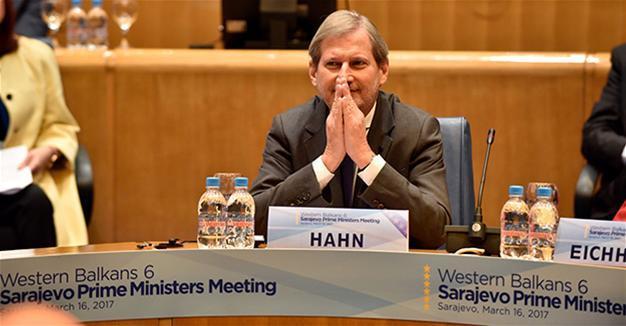Time has come to start fundamental discussion on EU-Turkey relations after referendum: Commissioner Hahn
BRUSSELS

AFP photo
Time has come to start a fundamental discussion on EU-Turkey relations following the April 16 referendum on constitutional amendments shifting the country’s governance system to an executive presidency, EU Enlargement Commissioner Johannes Hahn has said.
“The negotiations have already come to a point of failure due to the significant decline in Turkey in terms of the rule of law and media freedom. Currently, a new chapter cannot be opened even if the vast majority of the EU countries did not want to formally freeze the negotiations. After the referendum, however, time has come to start a fundamental discussion on EU-Turkey relations, including a possible re-evaluation of relations,” Hahn said in an interview with German news agency Deutsche Presse-Agentur (dpa) on April 19.
When asked about the potential date for such a discussion, the commissioner pointed to the informal meeting of EU foreign ministers later this month.
“I hope that we will have a first fundamental discussion at the informal meeting of EU foreign ministers at the end of April. I will, of course, bring my opinion and stance as the EU Commissioner responsible on the basis for the talks. The constitutional amendments and its implementation must now be assessed in the light of the criteria required for the candidate status,” Hahn said.
EU also shared concerns after the referendum results, which saw the 51 percent approval of the proposed changes, regarding the Venice Commission’s “serious concerns” on the country as well as the “deep split within the society,” according to Hahn.
“If the constitutional amendment is fully implemented, it means that Turkey will be further removed from European standards in terms of the separation of powers and the independence of the judiciary,” he said.
Hahn also noted that the issue of reinstating the capital punishment in Turkey, a proposal constantly wooed by President Recep Tayyip Erdoğan, would “absolutely” mean the end of the accession talks.
He, however, stressed the importance of maintaining close cooperation with Ankara in any case due to the fact that it is an important strategic neighbor.
“A more realistic form of relations has to be defined considering the interests of both sides and the real possibilities of Turkey. At the same time, it must be our aim to continue to support people who showed their commitment to keep democracy alive by casting ‘no’ votes despite the oppression on the freedom of expression. Turkey does not mean just Erdoğan,” Hahn said.
As for the international observers’ report on the failure of meeting international standards on the referendum, Hahn said the commission took it very seriously, while urging for initiating a broad discussion with Turkish politicians and all political parties on the implementation of changes.
“Regarding the allegations on possible electoral manipulations, we call on the Turkish authorities to follow these serious suspicions in a careful and transparent manner,” he said.
